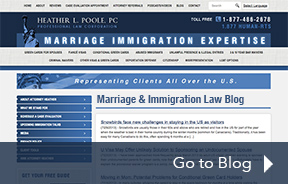But, what is “Extreme Hardship” in 3 & 10 Year Bar Cases?
In each case, to win, it must be determined that a combination of hardships takes the case beyond those hardships ordinarily associated with deportation, e.g., economic detriment due to loss of a job or efforts ordinarily required in relocating or adjusting to life in the native country. An analysis of hardship to U.S. citizen or LPR spouses and/or USC or LPR parents must be careful and individualized
Relevant factors include:
- age of the subject
- family ties in the United States and abroad;
- length of residence in the United States;
- conditions of health;
- conditions in the country to which the alien is returnable/qualifying relative would relocate, such as economic and political;
- financial status – business and occupation;
- the possibility of other means of adjustment of status for alien;
- whether of special assistance to the United States or community;
- alien’s immigration history;
- alien’s and qualifying relative’s position in the community;
- foreign languages spoken by alien and qualifying spouse or parent
ability of the USC or LPR spouse or parent to relocate to be with the alien (employment opportunities, relocation adjustment, foreign language(s) spoken; financial hardship in relocating); - financial hardship if stays in US without alien
the existence of qualifying spouse or parent’s property or business ties in the U.S.
Note: The more recent the acquired equities, the less weight they may be given; and the younger the marriage, or the wealthier the qualifying spouse (or indirectly – the alien), the better educated the qualifying spouse (or indirectly – the alien), or more employable the qualifying spouse in the country of the alien, the less likely there will be a finding of extreme hardship.
Attorney Heather L. Poole practices exclusively in the area of U.S. family-based immigration law and citizenship law. Heather is a nationally-published immigration author, frequent lecturer on immigration issues, and member & officer of the American Immigration Lawyers Association’s Southern California Chapter. For more information about Heather and the services offered, visit www.humanrightsattorney.com
![]()







Are there any cases in which persons who entered the United States without inspection may adjust status by marrying a US citizen?
Yes, one possibility may be 245(i). If the immigrant who entered illegally was under the age of 21 when s/he entered, the immigrant may be able to benefit from marriage to a US citizen now but only if ** the immigrant’s mother, father, or then spouse was sponsored for an immigrant visa by April 30, 2001.
The immigrant may also be able to take advantage of old 245(i) if the immigrant was sponsored directly by a LPR or USC parent, USC sister or brother, or employer by the cut off date of April 30, 2001.
An immigrant should always check with an immigration lawyer about 245(i) possibilities and the effect of prior deportation(s)/removals on the immigrant’s ability to take advantage of 245(i), depending on which circuit of appeals area the immigrant lives in.
My wife and I got married in 02/03/07. I am a U.S. citizen and she entered the United States with an F1 visa which expired 02/06/05. Would she be able to adjust status before she becomes a resident? Is there any penalty?
Hello,
I am a Canadian Citizen, recently married to my US Citizen husband and currently in the US. We have not filed anything because we have to weigh whether or not we should file my immigration papers here or in Canada.
We have two things working against us:
1) I overstayed in 2006 (never longer than 6 mos. consecutive), but because I’m Canadian I have no I-94 or stamps in my passport. I did use my machine-readable passport for id when i traveled in-and-out of the US in 2006. Wondering if they will know I overstayed?
2) We married only 45-days after my last entry in the country.
QUESTIONS:
*If I file in the US, it doesn’t matter that i overstayed. But, if i file in Canada will I get barred form the US for 3 or 10 years?
*If I file in Canada, it doesn’t matter that we married with 60-days. If I file in the US, they may consider it fraud…”unlawful intent”…because I entered as a visitor. We may be able to explain ourselves on this one.
PLEASE HELP! I NEED SOME ADVICE. 3 IMMIGRATION ATTORNEYS, ALL WITH DIFFERENT ADVICE.
SHOULD I FILE IN CANADA OR THE US?????
Thanks kindly
We applied for a K-1 Fiance Visa back in Dec and was just on the brink of approval when USCIS in Ankara wrote to me to let me know that my fiance had violated 212 (6) (c) (i). Misrepresentation of material facts all the way back in Feb 1999. He has not been in any trouble with the law and they have told me that he is able to apply for a waiver (I-601). My question is is that they told me that violation of this code leads to a “lifetime exclusion”. I don’t think this is true and never heard of that. He told me that they said that he could not try to enter again in 5 years. It has been eight. He was 25 at the time and some man who worked for a tourism company claimed that he had a good friend that worked for the Embassy and that if Bahadir paid him $ 2000, he would give him a B-1 Visa. This man lied and deceived Bahadir and he has been wondering since that day why they did not allow him in. Is there anything we can do about it or do we still have to file the I-601. I have been communicating with IV UNIT in Ankara and they seem quite friendly to me. They said that if we could prove an Extreme Hardship then they will grant him the waiver. It has to go the Athens Greece however to Dept. Of Homeland Security since there is not one in Turkey I guess. Can you please help me. I am 37 years old and want to have a family and this mans love is genuine and we want to marry. Also, I have a commercial cleaning business that I have no employees for and need his help with the work.
Jennifer M. Dunn
For James:
If your wife entered the US legally (with her F-1), then she is eligible to adjust as long as she did not leave once her F-1 expired. Regardless, F-1s are tricky. The I-94 is marked D/S for duration of stay, meaning that she is has not overstayed until CIS makes such a formal finding or if she violates her status by not attending her school program.
Additional issues that may be raised in this situation include:
(1) potential visa fraud – CIS may claim that she never went to school or obtained her F-1 fraudulently if she quit school soon after she entered the U.S.;
(2) bona fide marriage – Once the overstay is recognized, CIS may conclude that the marriage is one of convenience, for her to legalize her status, not entered into for love because she was out of status. They may require more joint documentation of commingled financial assets and other proof to show the marriage is real.
Hello Atty Heather! I need some advised I have been in the US for about 4 years…I entered as visitor,for personal reason I could no go back to my country when i should so I overstay all this time…over the course I met my fiance ( engaged for 3 yrs) we recently got maried legally through the court so we can file for my green card…we have not live together during this time, we dont have joint documents because we were just fiances… we are both christian and will be together once we get married through the church…so my question is should i file now or should i wait till we get formaly married and joints documents?,,,,,,,all this process is too confused …..you trying to do things right in your heart but for what i heard I guess inmigration does not care about true love and values….all they care is about document proof… forcing people to lie sometimes? what should I do.Thanks
You need to be careful. Immigration papers can be one reason for marrying a person, but cannot be the sole reason. This means if you are in love but are rushing the wedding to secure immigration status, then this is still legit. You don’t have to wait to have a formal church wedding to file the AOS (adjustment of status/green card) paperwork. I have many clients who have had a court or civil wedding which means applying for the immigration benefit becomes faster but have waited to have the religious or big family wedding later when they can financially afford it. As long as the intent of the parties is marriage for love, with the added benefit of securing legal status, then this does not constitute “marriage fraud” for immigration purposes.
As for timing, many AOS applications can take as little as 4-6 months to reach interview. You should consider this when deciding when to open joint bank accounts or other joint documentation to show the marriage is real or bona fide. It can be difficult to show many documents unless there has been a long relationship before the marriage to show that the marriage is real. Always be aware of local processing times on AOS in your district and how long it will take to get a work permit so you can open joint accounts to have that history of use.
My fiance was stopped during an EWI and given an NTA. She failed to show up to court and was detained 5 years later.
We have lived together 4 years. I am a US citizen retired Law enforcement / injured on the job.
She was deported with a 10 year ban.
She is being harassed in her country because of her contact with me Police officer) @ I take my life in danger going there. (Honduras) Can she apply for a hardship I-601 or must wait as least 5 years. There are other hardship factors also.